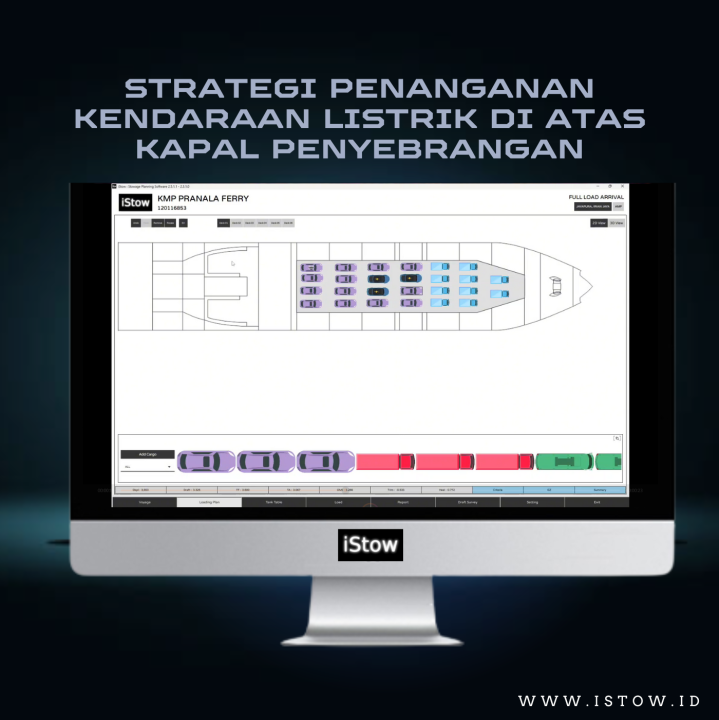Strategy for Handling Electric Vehicles on Ferry
20 March 2024
With the increasing popularity of electric vehicles as an environmentally friendly transportation option, it is important for ferry transportation providers to prepare themselves to accommodate electric vehicle owners during the Lebaran holiday season. Special preparation steps are required to ensure the safety and comfort of ferry passengers using electric vehicles during their journey.
There are several optimal strategies that can be implemented to enhance the efficiency and sustainability of electric vehicles during ferry transportation for Lebaran season:
Proper Stowage Planning
Electric vehicles should be stored in designated areas, as per the guidance issued by the Australian Maritime Safety Authority (AMSA), away from engine rooms, emergency equipment, hazardous goods, passengers, including exit routes, and passenger gathering points. The suggested location for electric vehicle placement is on the weather deck or open deck.

Electric vehicles in load plan (2024). Foto: Pranala Digital Transmaritim
Battery System Monitoring
Implementing real-time battery condition monitoring systems on the ferry can help optimize power management. By monitoring battery performance, ship operators can anticipate potential issues and take preventive actions. One preventive measure is to ensure that the vehicle batteries have a capacity level of less than 25% before boarding the ferry.
Providing Understanding to Vehicle Owners
Providing information to electric vehicle owners about usage protocols during ferry journeys, such as maintaining battery levels not too high before boarding the ferry, can help prevent fires and accidents while the electric vehicles are on board.
Charging Technology at Origin and Destination Ports
Developing charging technology at both origin and destination ports for ferry users can provide extra convenience to electric vehicle owners. This is a follow-up to battery capacity monitoring, ensuring that ferry users do not worry about charging facilities upon reaching their destination ports.
Weather and Sea Condition Monitoring
Authorities should carefully monitor weather and sea conditions during Lebaran season. Operational decisions regarding ferry services should consider these factors to ensure the safety of all passengers, including electric vehicle owners.
Crew Training
Ship crews should receive specific training in handling electric vehicles, including charging procedures and emergency actions related to electric vehicles. They should be ready to assist electric vehicle owners during the charging process and have knowledge of how to address any potential issues.
Providing Optimal Safety Equipment
Safety equipment is crucial in the event of a ferry accident. Safety equipment preparation is an obligation for all ferry transportation providers. Especially with electric vehicles having a higher potential risk of fire on board, ferry service providers are advised to prepare specific safety equipment for electric vehicles according to recommendations regarding handling electric vehicles on ferries.
By taking appropriate preparation steps, ferry transportation providers can ensure a safe and comfortable travel experience for electric vehicle owners during the Lebaran holiday season. This will also help promote the use of electric vehicles as a more sustainable and environmentally friendly transportation option while prioritizing ferry safety.

